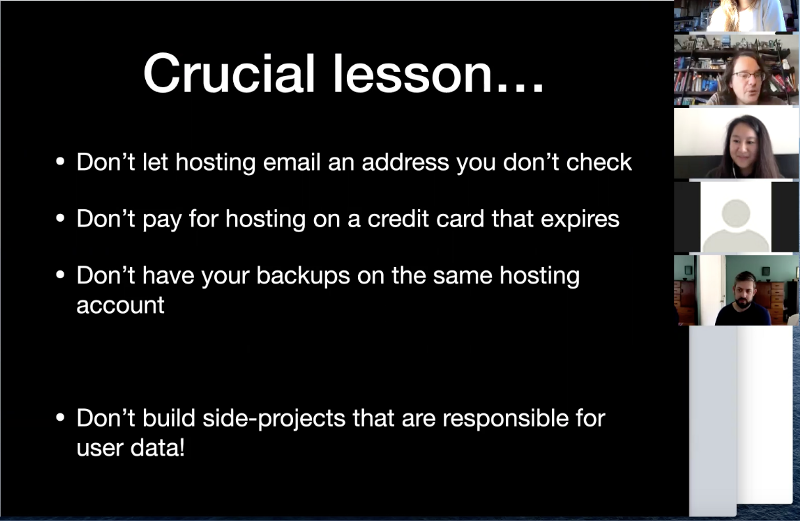Simon Willison: My career in side projects and open source
The co-creator of the Django web framework, Simon joined us for a discussion of his lessons taken from a career full of open-source projects.

Submitted by Julian Gay and Ashlee Flagg
Simon describes himself as a “jack of all trades, master of none”. As a co-creator of the Django web framework, Simon has a long history of open source projects with frequent forays into side projects that are both fun and inspiring.
After his company, Lanyrd (YC W11), was acquired in 2013, he served a six year term at Eventbrite in engineering management. Although he remained “hands-on”, his leadership responsibilities precluded him being on the critical path of getting anything shipped, so he channelled his creative energies into side projects. The first notable project being an internal document search tool providing a unified view of the company’s documentation. Following the theme of “breaking down silos”, Simon turned one of his hobbies into a full time gig, Datasette, an open-source tool for investigative journalists to explore and publish their own data, that he developed while a Stanford JSK Fellow.
In addition to his more serious open-source works, he took us on sightseeing tour of some of his more whimsical projects, the ones that worked and the ones that didn’t. He left us with a few pieces of advice for anyone looking to make a career out of their own side projects:
- Leverage the “community” by enabling the development of tools and plugins that enhance your project’s capabilities — “The great thing about a plugin ecosystem is that it removes the need for a gatekeeper: anyone can build and release a plugin independent of Datasette core, which both lowers the barriers to entry and dramatically increases the rate at which new functionality becomes available to all Datasette users.”
- Side projects should be “self-sustainable”, that’s to say, cheap to run and with minimal moving parts (that could potentially break down the line!). owlsnearme.com uses inaturalist.org’s API to search for owls. “It’s cheap to host, it can’t break, all data comes from someone else’s API, and you’re not responsible for user data. It therefore takes almost zero mental energy.”
- The trajectory of most startups is to eventually peter out. So, create only open source projects for this reason. “Everything we build is built on top of a foundation of open source software.”
Thank you to Simon Willison for sharing his learnings with the community and to Kathy Qian for making the introduction. Check out Simon’s website to learn about his other fun & interesting side projects: https://simonwillison.net/
Thank you for reading and we hope to see you at our next South Park Commons event (sign up here!). If you’re interested in membership, please apply on our website and one of our members will reach out.
So what is SPC? We’re a self-organizing community of technologists, tinkerers, and domain experts based in San Francisco. We are building new (and sometimes unorthodox) ventures — ranging from enterprise startups and consumer apps, to open source ML and civic-tech projects. We come together, virtually and in the physical world, to learn from each other, challenge ourselves, and validate new ideas.
Our members also host a recurring events series. Our goal is to bring new and exciting ideas and technologies into the community as well as valuable learnings from those who have first-hand experience building their life’s work. In the past we’ve hosted Silicon Valley VCs and CEOs like Reid Hoffman and Mike Kreiger, leaders like CEO of U.S. Digital Response Raylene Yung and SF Mayor London Breed, and domain experts like Nobel laureate Dr. Saul Perlmutter, experimental physicist Dr. Rana Adhikari, and Howard Hughes Investigator Wendell Lim, amongst many others.
Our on-the-record talks are posted to the SPC Youtube channel. You can also sign up for our events mailing list or newsletter to stay in the loop.
